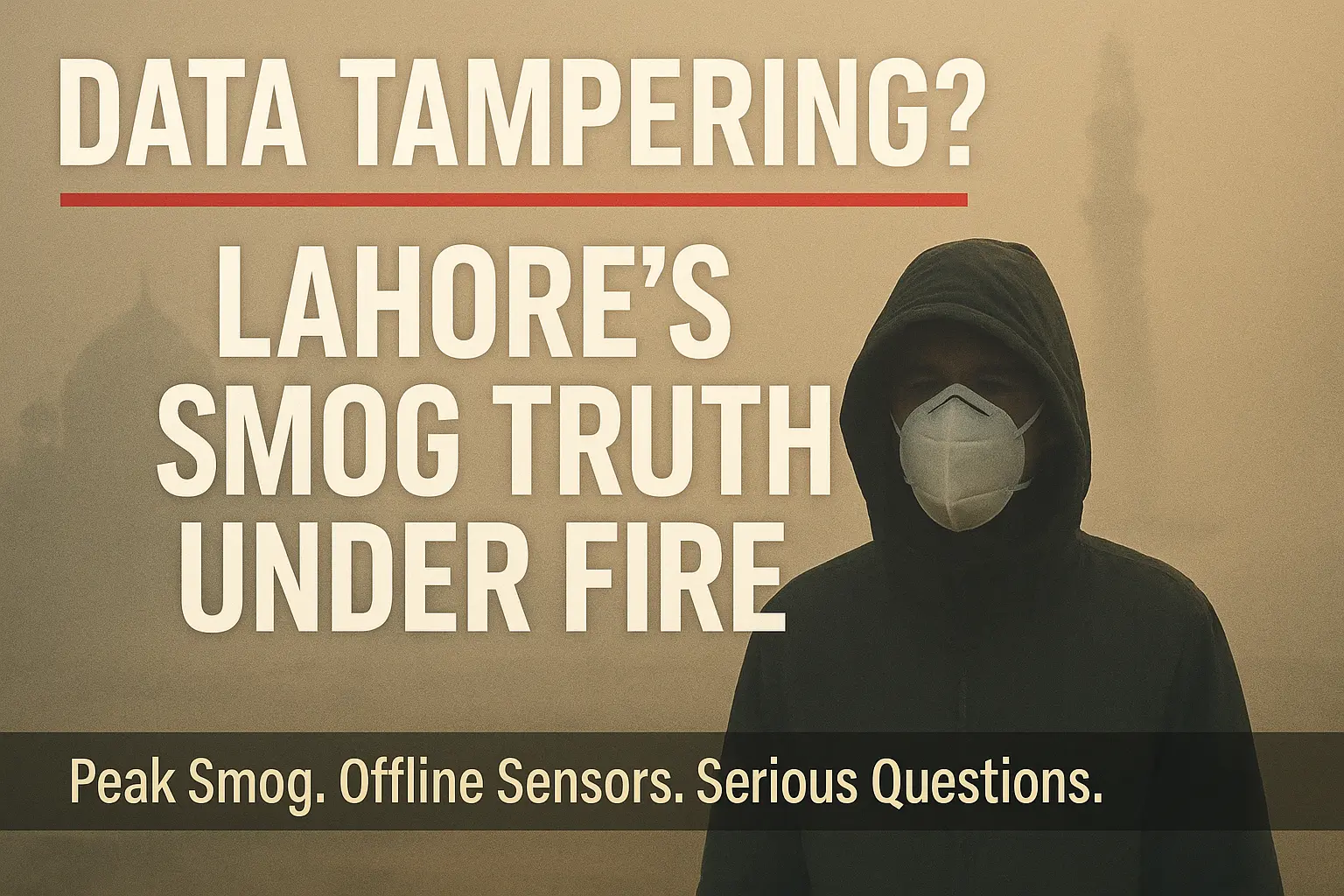Honestly, if you live in Lahore, you already know what breathing here feels like during smog season.
Your throat burns. Your eyes sting. Children cough non-stop. Hospitals fill up.
Now imagine relying on official air quality data to protect your family…
and suddenly the data disappears when smog is at its worst.
That’s exactly what sparked a storm recently.
Air quality monitors in Lahore reportedly went offline during peak smog hours.
Government called it a “technical glitch.” But citizens and climate experts think otherwise.
And to be honest, when public health is at stake, silence feels worse than pollution.
So let’s unpack what really happened, why it matters, and what it means for you.
What Happened in Lahore?
During one of the worst smog phases, multiple air monitoring stations in Lahore suddenly stopped showing data especially in the most polluted areas.
Later, the government said it was just a brief technical fault that got fixed.
But here’s the thing…
No urgent alert. No public warning. No live explanation.
Just silence — until citizens started questioning it online.
This gap is what triggered suspicion.
Why People Are Suspicious
Let’s keep it real. When meters go dark at the exact moment pollution hits the highest… and only get “fixed” after backlash… People will raise eyebrows.
Key concerns
• Timing looked too convenient
• Worst-hit zones mysteriously went offline
• Delayed official explanation
• No real-time alert for public safety
If it was truly technical, why wasn’t the public informed instantly?
In public health, silence isn’t a glitch it’s negligence.
Why This Matters More Than You Think
Even if there was no bad intention, the real issue is trust.
When authorities delay communication, it doesn’t just look careless
it looks like someone tried to hide reality.
And honestly, millions of people breathe Lahore’s air every morning.
We’re not talking about a minor weather error. Smog is a health emergency.
Kids. Asthma patients. Elderly. Pregnant women. Outdoor workers.
They rely on real-time air alerts to stay safe.
When data disappears, it puts lives at risk.
What the Government Says
Officials say it was a technical glitch, flagged and resolved same day.
They even praised the system for detecting the issue quickly.
But… people didn’t see any alert until AFTER the outrage.
And that’s where trust breaks.
Because transparency is not just about fixing problems
it’s about telling the public while it’s happening.
Let’s Be Fair: Technical Glitches Do Happen
Technology fails. Sensors freeze. Networks drop.
It happens everywhere in the world.
But here’s the part nobody talks about…
Good governance is judged by how fast and how openly you communicate.
If there had been a quick message like:
“Air quality monitoring temporary glitch. Fix underway. Please rely on backup sources meanwhile.”
No controversy. No headlines. No suspicion.
Simple communication could have avoided all this.
The Bigger Picture: Lahore’s Smog Crisis
If you’ve ever stepped out in November–January, you know:
• Breathing feels like smoking
• Masks feel useless
• Schools close
• Flights and motorways shut
• Children fall sick
• Outdoor exercise becomes dangerous
Independent global trackers already list Lahore among the worst cities for air quality.
So even if the system went offline, honestly…
nobody believes pollution suddenly became better.
Data silence doesn’t fix smog — it just breaks trust.
So What Should Happen Now?
If the goal is public trust and real action, here’s what should be done:
✅ Real-time alerts for any system outages
✅ Open logs or transparency report
✅ Allow independent verification & third-party monitors
✅ Trained crisis communication desk
✅ Public health warning protocols during smog spikes
It’s simple — people deserve to know what they’re breathing.
What You Can Do to Stay Safe
Until transparency improves, protect your family yourself:
• Check multiple AQI apps (not just official)
• Use N95 or KN95 masks outdoors
• Keep indoor plants & air purifiers
• Avoid morning walks during smog season
• Give kids steam & warm honey water
• Use saline spray to protect nasal passages
Health comes first. Always.
FAQs (People Also Ask)
Was Lahore’s air quality data manipulated?
There’s no official proof — but the timing and lack of early alerts made many people suspicious.
What did the govt say about the outage?
They called it a “brief technical glitch” and said it was fixed quickly.
Why is air quality monitoring important?
Because smog causes breathing issues, heart disease, and long-term lung damage especially in children.
How can I check real AQI in Lahore?
Use multiple apps, not just one source. This reduces dependency.
Can the government improve transparency?
Yes — by issuing real-time alerts, opening logs, and working with third-party systems.
Final Thoughts
Look, nobody expects perfection. Glitches happen.
What matters is honesty, speed, and care for human lives.
When air becomes poison, data becomes oxygen.
And people deserve the truth about what they’re breathing
not silence, not delays, not excuses.
Because public trust, once damaged, is harder to fix than a server.
Let’s hope transparency wins over optics — and clean air becomes a right, not a privilege.










